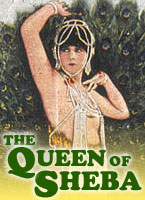
History
Reception criticism | About the Queen of Sheba | Works with significant art-historical commentary | Reference | Contemporary artists | Pocket bios | Collections | Nutty | Videos
About the Queen of Sheba
See also reception criticism.
Site for the book "Queen of Sheba: Treasures from Ancient Yemen" (exhibition companion-book). Attractive, well-planned and written website gives a good introduction to the Queen of Sheba and her "reception."
In Search Of Myths And Heroes: The Queen Of Sheba by Michael Wood. Seven-page foray into the conflicting, inconclusive ancient and medieval sources. Wood—the same guy who did the estimable In the Footsteps of Alexander—holds up hope of a solution, but ends in aporia. As Wood writes:
"No other popular heroine is so celebrated but so puzzling"It ends in a good, popular bibliography.
Makeda, Queen of Sheba by Tracy Marks (1989-2001). This is an entertaining multi-page source-based exploration of the topic, leaning particularly on the Bible and the Kebra Negast. The narrative is smooth and enjoyable, summarizing or quoting many stories not found elsewhere on the internet—a good read and a good guide to the source tradition. What it is not is good history. Marks' methodology is positivist and naive, throwing all the legends together as "data," and weaving a narrative that makes all of it true. Source critical problems are never raised. The Hellenistic "Wisdom of Solomon" are quoted as the King's own words. Josephus' summary of the biblical data, with a few folk-tale details thrown in, is treated as an independent and authoritative account. There is no sense of a "developing" tradition, or of the limits of historical inquiry under such circumstances. Mark's collects a number of Sheba poems, a good bibliography and some web links.
"The Queen of Sheba's visit to King Solomon" by Art Scott, a Vancouver Mason. Scott recounts much of the biblical and extra-biblical data. The stated goal is explain the Queen of Sheba's prominence in a Masonic ceremony, "The Board of Installed Masters"—otherwise undescribed. The review is comprehensive and fluent, but I'm still interested in the core question. I suspect earlier generations of masons were more interested in the idea of the Queen's "occult questions" than theories of economic exchange. Much depends when the ceremony came about.
![]() The Connection: "The Queen of Sheba." Boston-based NPR interview show hosted by Tom Ashbrook spends an hour with Clapp (author of
Sheba), Carole Fontaine, a Feminist theologian/scholar[1] and Ephraim Isaac, the director of the Institute of Semitic Studies at Princeton. The Connection is one of my favorite NPR shows. This one is a little frustrating. Clapp is a natural, entertaining and inspiring communicator[2], who would have been set off well by a less ebullient scholar. Instead Prof. Fontaine attempts to out-popularize Clapp, "talking down" in a singularly grating way. Isaac, who joins the conversation later, comes off a pedant—he keeps mentioning that he wrote something about something—but is refreshingly disdainful of "spin" and sloppy talking, correcting Clapp and Fontaine for calling the queen just "Sheba." I also like what I took as a dig at Clapp, that yes he too had been to all the places Clapp had. When Isaac presses the unparalleled stature of the Queen of Sheba in Ethiopian culture Ashbrook cuts him off and is later clearly relieved to get him off the phone.
The Connection: "The Queen of Sheba." Boston-based NPR interview show hosted by Tom Ashbrook spends an hour with Clapp (author of
Sheba), Carole Fontaine, a Feminist theologian/scholar[1] and Ephraim Isaac, the director of the Institute of Semitic Studies at Princeton. The Connection is one of my favorite NPR shows. This one is a little frustrating. Clapp is a natural, entertaining and inspiring communicator[2], who would have been set off well by a less ebullient scholar. Instead Prof. Fontaine attempts to out-popularize Clapp, "talking down" in a singularly grating way. Isaac, who joins the conversation later, comes off a pedant—he keeps mentioning that he wrote something about something—but is refreshingly disdainful of "spin" and sloppy talking, correcting Clapp and Fontaine for calling the queen just "Sheba." I also like what I took as a dig at Clapp, that yes he too had been to all the places Clapp had. When Isaac presses the unparalleled stature of the Queen of Sheba in Ethiopian culture Ashbrook cuts him off and is later clearly relieved to get him off the phone.
Reference
1901-1906 Jewish Encyclopedia entry by Joseph Jacobs and Ludwig Blau, covering the queen in the Bible, Abyssinian legends, the Koran and Jewish legends. As usual, the JE is the best general scholarly resource online, which has as much to do with the lack of good scholarship online as the work itself, which is somewhat dated.
Wikipedia: Queen of Sheba, Sheba, Similarities between the Bible and the Qur'an. Wikipedia religion entries are often unreliable; these are okay.
The International Standard Bible Encyclopedia surveys the OT story, the NT use and glances over extra-biblical material.
Pocket bios
Encyclopedia Mythica: Queen of Sheba by Alan G. Hefner. Mostly a retelling of 1 Kings. Also here.
Brief biography by Phillip True, Jr. from Africa Within.
Daily Bible Study, mostly quoting the RSV.
Mini bio from the Women's International Center.
Nutty
The Queen of Sheba and Solomon and Sheba, retelling legends and adding some of their own. I didn't read this stuff too closely. The containing site advocates all sorts of nutty stuff—Mars "structures," Atlantis (it's in Mexico), Phoenicians in Oklahoma, ancient alphabets found in Australia and Colorado, and that most venerable of conspiracies: Fluoridation!
![]() Queen of Sheba and Israel by Bernard Leeman (continued in
part two and
part three.) From
The Queen of Sheba Group. A book-length exposition of a nutty theory:
Queen of Sheba and Israel by Bernard Leeman (continued in
part two and
part three.) From
The Queen of Sheba Group. A book-length exposition of a nutty theory:
"This book is designed to introduce college-level students to Old Testament history and to show that in western Arabia and in the Horn of Africa evidence relating to the Queen of Sheba indicates that the Promised Land was most likely in western Arabia, not in Palestine."
Videos
 Amazon. Biography: Solomon & Sheba (1996)
Amazon. Biography: Solomon & Sheba (1996)
Notes:
- Check out her blog Extreme Bible, where Fontaine (pen-name "Anatyahu," an "ancient goddesses of the Jews") attacks America's "genocidal" attack on Iraq, oozes bile for the "ChristoFascist Right and their Corporate Masters," finds the Auschwitz commemorations "hard given Sudan, Fallujah, Baghdad, the systematic discrimination against African American voters in this nation," etc. With friends like this, liberal Christians like me don't need enemies. (back)
- I presume his tongue is misfiring when he says "There are well over forty cases of Arab queens—major and minor—that have been documented, particularly by Boccaccio." (back)
All material © 2000–2005 Tim Spalding (contact)
Books presented in association with Amazon.com.
If you enjoy this site you may like this other site by me:
Mermaids on the Web. Similar site, with over 1,320 pictures .
Angels on the Web. Images and other web resources on angels in Western culture, religion and art.
